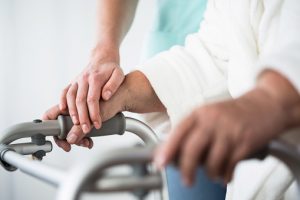
The end goal of the development of this haptic device is to increase the mobility of the wearer and prevent or reduce the isolation that may be experienced during stroke recovery due to reduced mobility. At the helm of the project is Dr. Rachel C. Stockley and Glenis Donaldson from Manchester Metropolitan University’s Department of Health Professions, as well as Professor Josie Tetley from the Department of Nursing.
Dr. Stockley addressed the need for the haptic device, stating “Whilst advances in medical treatment mean that many people are more likely to survive stroke and have improved outcomes, walking and specifically walking in the community, continues to be a significant problem for over half of all stroke survivors.” Regaining motor skills and mobility is a crucial aspect of stroke rehabilitation, as it can affect both the physical and mental states of survivors.
When mobility is lost, so is the ability to go out into the community and socialize, which in turn can lead to a lost sense of purpose. This loss of purpose can increase the burden placed on caregivers and even lead to more serious complications directly related to a sedentary lifestyle. Without proper mobility, stroke survivors are more likely to develop cardiovascular disease or exacerbate any pre-existing issues related to the heart. Sedentary lifestyles have also been linked to the development of high blood pressure, as well as anxiety and depression. These mood disorders will only worsen if the patient remains sedentary and isolated.
The potential cardiovascular risks are especially concerning for stroke survivors, seeing as 87 percent of all strokes that effect Americans are ischemic strokes, which occur when blood flow to the brain is blocked. Therefore, remaining inactive and isolated not only hinders the recovery of survivors, but it may also increase the risk of a recurring stroke. According to the Center for Disease Control, approximately 185,000 of the people who experience a stroke annually have already suffered at least one other stroke in their lifetime.
Strokes are one of the leading causes of death in the United States, responsible for nearly 1 in every 20 deaths annually, while more than 795,000 Americans experience a stroke each year. As strokes are so prevalent among the general population, better rehabilitation techniques are needed in order to aid in the recovery and well-being of stroke survivors. This new haptic device could help to increase the effectiveness of walking therapy and expedite the recovery process, though it is still in the early stages of development and not yet ready for the commercial market.
Related: Stroke risk in men and women: Know the difference